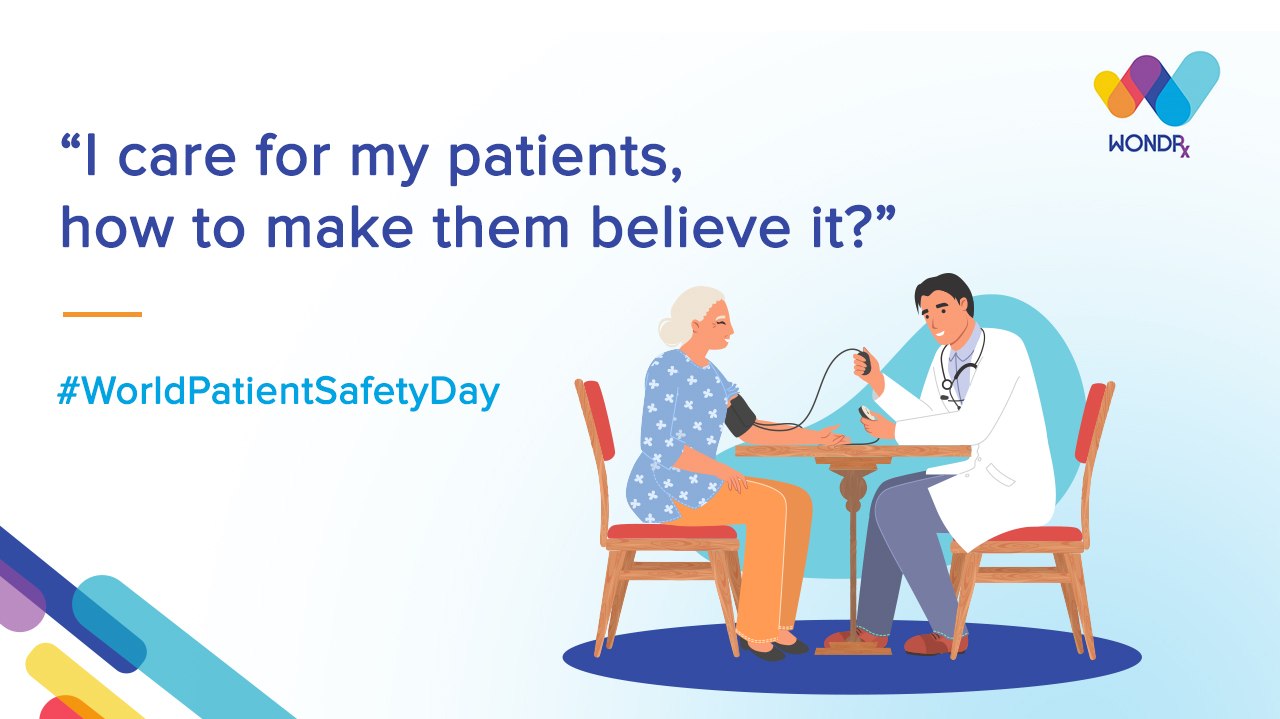“This World Patient Safety Day, I pledge to…” - A doctor’s guide to Medication Safety

With technological advancements, even though people today reap the benefits of an easy and smooth life, several health problems have become rampant due to unhealthy lifestyles. Metabolic diseases, being overweight, joint and skeletal problems, cardiovascular diseases, hypertension, etc. have become extremely common in today's era. This in turn has caused almost every person around the world to, at some point in their life, take medications to prevent or treat illness.
However, medications sometimes cause more harm than good if incorrectly stored, prescribed, dispensed, or administered. According to WHO, 2.6 million deaths are recorded each year due to unsafe care. So, this World Patient Safety Day, let’s discuss how healthcare workers can improve patient safety by adopting several safe practices in administering care. It could be as simple as providing digitized medical records and notes to the patients.
The National Center for Biotechnology Information (NCBI) reports that patient-centered care helps with reduced pain and discomfort, faster physical and emotional recovery, as well as improved outcomes and quality of life. So how can health tech assist healthcare providers in pledging to enhance medication safety and reduce patient harm? Read on.
HealthTech can coordinate patient care with other providers
A successful patient-centered healthcare system should enable communication between various healthcare settings. When patient data is shared at multiple levels of the healthcare pyramid, coordinating with other healthcare providers becomes smooth and hassle-free. When a patient’s medical history can be accessed by professionals in primary care, urgent care, long-term care, and specialty care, it is easier for doctors to track pain, medication, as well as mental and behavioral health challenges. This shows that they’re practicing whole-person care. Multiple healthcare providers can also track patient care, identify opportunities, give patients access to their medical records, enhance patient communication with medical professionals, and improve care plan compliance.
Help your patients manage their medications
Because medications can affect each patient differently, it’s important to keep a close eye on a patient's response to every medicine and to offer alternative pain management options. Once the prescribed medication is accessible to all stakeholders on a particular care management platform, it will be easier to manage medication reconciliation issues. Specialized next-generation software can help to keep track of patients' behaviors, overdosing, underdosing, or missing medications. This transparency ensures understanding by care team members about what may be interfering with prescription adherence.
Support your patients’ mental health
According to the National Institute of Mental Health, physical trauma and chronic health dysfunction can cause depression or anxiety in your patients. Patients experiencing Parkinson’s disease, cancer, or thyroid disorders often report symptoms that mimic depression. By implementing an accessible patient care management system, healthcare systems can provide mental healthcare across facilities and enable various medical professionals to help address mental health issues. A platform that provides a patient support program can relieve the burden of mental health screening, assessment, and specialist referrals. Supporting a patient's mental health is about providing better patient care with fewer administrative tasks!
Address your patient's physical needs
Whether a patient needs a pain management program or daily exercise, any patient would appreciate continual guidance, reminders, and motivation. An ideal patient-centered healthcare system works at its optimum level when they're helping weak or anxious patients with necessary tasks, creating a soothing, restorative environment, and then checking in post-OPD situations to make sure its patients' experience was conducive to healing. With technological advancements, health-tech companies can devise a custom care plan to nurture a patient’s basic physical needs regarding their physical health.
It’s worth noting that according to the National Institutes of Health, high-quality patient care requires excellent infrastructure, a strong training system, care team competence, and efficient health technology. Writing an Rx warrants ownership of the doctor and ensures patient engagement, as opposed to typing, which could possibly lead to creating a patient-doctor disconnect, as well as human errors like typing errors and incorrect selection in the prescription. Thus, an optimal healthcare system that benefits patients, and necessitates communication and education, can only be provided by a robust health tech platform. Today, WONDRx is a proud patient-centric solution that is building an efficient and seamless Fulfillment Ecosystem (FES) that invests more time and energy into patient care priorities like education and empowers them to manage their care!